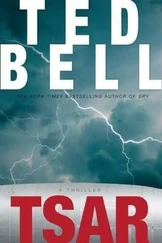An invitation to call upon C at home was most unusual. Originally, C had invited Hawke and Congreve to lunch with him outside on his sunny terrace. It was to be a working repast, he said, an informal chat covering a range of topics. But Hawke knew that C especially wanted to hear about the prior day’s visit to the Tunbridge Wells hospital. The chief of MI6 wanted to hear firsthand what had been revealed to Ambrose yesterday by the late Ambassador Zimmermann.
Hands clasped behind his back, the happy detective had been striding back and forth in front of a small fire laid against the afternoon chill. He was dressed in his favorite suit of tweeds and was wearing, like his fashion idol, the late lamented Andrew Devonshire, bright yellow cable-stitched socks. He had now relayed to C some, if not most, of what had spilled from the dying German’s lips.
Suddenly, Ambrose stopped in midstride. He stood in the middle of the faded Persian carpet, a perfect ring of blue smoke wafting above his head, waiting for some reaction from Alex Hawke.
There was none.
A semi-reclining Hawke stared wistfully down at the mist-shrouded forest, the thick trunks and bare limbs etched black against the stormy gray sky. A dense plantation of pine, beech, silver birch, and oak grew on three sides of the house. Forests had been magic for him as a child, and, he realized, they still were. Finally, he looked up and smiled at Congreve.
“Sorry. You were speaking of Room 40,” Hawke said from his window perch. “Tell me about those fellows again? Kept a low profile, did they not?”
“Yes, Ambrose,” C said, taking a long puff of his cheroot. “You might refresh both our memories. I think we’ve got a few more minutes until luncheon is served.”
“It was the most secret room in all of Whitehall,” Congreve said, resuming his brisk pacing before the fire. “Masked under the deliberately guileless name of Room 40, a pair of civilians had been diverted there to do cryptographic work. One morning, at a very low point of the war, they intercepted a German wireless transmission in a code no one had ever seen before. But the two chaps, Montgomery and de gray were their names, were determined. They ultimately broke the code and, in doing so, discovered the key to the whole thing.”
“What, pray, was the whole thing?” Hawke said, his mind elsewhere but his interest piqued. “I remember learning about this in school but I’m afraid it’s been a while.”
“Why, the stalemate, of course,” C said. “The dreadful deadlock that gripped both armies in the trenches along the Western Front.”
“And the key?”
C said, “The key to unlocking this stalemate was finding some way of convincing President Woodrow Wilson that the Krauts were coming after the Yanks’neck, too. It was vital to convince Wilson to get the Yanks into the bloody war. This Zimmermann Telegram, sent from Germany to their station in Mexico City, revealed the German duplicity. And, Mexico’s desire to get into the war on Germany’s side.”
“Yes,” Congreve added, “it did the trick. Once the contents of the telegram were published in the American newspapers, there was a huge shift in American public opinion against the Germans. There was now no way Wilson could keep the Yanks out of the war.
“The Americans suddenly had the duplicitous German and Mexican treachery laid out for them in black and white, right there at the breakfast table.”
“And over they came. Thus this Zimmermann Telegram saved England’s bacon at the last hour,” Hawke said, his eyes following a ragged squadron of geese skimming the distant treetops.
“Indeed,” C said, expelling a gray plume of smoke. “None of us likes to admit it, of course, but there you have it.”
“But what’s all this ancient history got to do with our present situation?”
“The present situation?” Sir David said, looking carefully at Alex. “I’ve got one word for you, Alex. Mexican treachery again rears its ugly head. To be more precise, the Mexican border. The Americans have ignored that problem for nearly a century. They can’t do it much longer.”
“Not all quiet on the Southern Front,” Alex said.
“The Southern Front,” C repeated, liking the sound of that. It was good shorthand for the direction his mind was taking. “The Mexicans were the key to the Great War,” he added, “and they bloody well may be the key to the next.”
“And we’ve got a German ambassador named Zimmermann involved in both.”
“Mere coincidence?” Hawke asked.
“Perhaps,” C said. “History has a way of repeating itself.”
C got to his feet and rubbed his hands together to warm them up. “Well. I’m famished. Feed a cold and starve a fever. I’m sure there is sustenance to be had in the dining room. Let’s continue this at the table, shall we? I’ll go make sure we’ve got a good claret to accompany the delicious goose the kitchen has prepared.”
C left them, pushing through the double doors and into the adjoining hallway that led to the dining room.
“Are you quite all right?” Congreve asked Hawke.
“I suppose.”
21
C learly, Hawke wasn’t all right. Congreve knew Hawke’s many moods, including this one, the black fugue. His condition, at least this present distraction, Ambrose believed, was hardly a deficit or even a mild disorder. It was simply the restless curiosity of a hungry mind. If anything, it explained the man’s early success in both the military and in the financial markets. And his recent triumphs in the dicey world of international espionage. Hawke’s mind was constantly ranging over a wide spectrum of subjects, often touching down only briefly before moving on. Congreve believed it was what the brain so rapidly assimilated during those brief encounters that mattered. Retention, it was called.
It surely accounted for Hawke’s ability to take by surprise those who dismissed him as merely a wealthy aristocrat laboring in the family’s financial vineyards; or those who too quickly took the measure of his strength or courage and found him wanting. Congreve hadn’t enough fingers on both hands to count the number of villains who had made the deadly mistake of underestimating Alex Hawke in these last years.
“Let’s go in, shall we?” Congreve said softly, putting a hand on Alex’s shoulder. “He’s waiting.”
“Of course. I’m sorry to be so distracted. I’ve been sick with the bloody fever again. Does something to my brain. I’ve promised C I’d call Consuelo about getting invited to this damn meeting in Key West. Well, I damn well haven’t done it, and I’m sure he’s going to bring it up.”
“Why haven’t you called her?”
“The woman hates me, Ambrose. She feels utterly betrayed and not without some justification. I’ve been rather a shit. I’ve no idea how I’m going to accommodate C’s request. He’s right, of course, to want me there in Florida. Conch’s gathering is likely to prove vital.”
“The professional should override the personal, I should think, Alex. We’ll think of something. Just keep him going on about history during lunch. You can ring her as soon as you get home.”
“And say what?”
“Tell her you can’t live without her, for starters.”
“I won’t lie to the woman.”
“Are you quite sure it would be one?”
“A lie? How should I know?”
Hawke cut his eyes toward him and left without another word. For now, Conch would remain the enigma she had long been.
They found C at the oval dining table, filling their goblets with an ’89 Château Batailley. Hawke had long ago learned not to bring up the subject of C’s unwavering loyalty to the French vintners if not their wretched government. Any such discussion would prove fruitless and unpleasant.
Читать дальше












